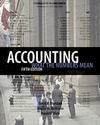 |  Accounting: What the Numbers Mean, 5/e David H. Marshall,
Millikin University
Wayne W. McManus,
International College of the Cayman Islands
Daniel F. Viele,
Webster University
Cost Analysis for Planning
Chapter 14 Outline
Introduction- Why Budgets are Useful
- Definition of Performance Reporting
|
 |  |  | Cost Classifications- Relationship of Cost to Volume of Activity
- Variable cost.
- Fixed cost.
- Mixed cost.
- According to a Time-Frame Perspective
- Committed cost
- Discretionary cost
|
 |  |  | Budgeting- The Budgeting Process in General
- Usefulness of budgets--A function of management philosophy.
- Budget as a guide to action.
- Top management dictated, or participative approach.
- Starting point for budget.
- Actual performance of current period.
- Zero-based budgeting approach.
- The Budget Time Frame
- Single period.
- Multi-period, rolling budget.
- Different periods for different budgets.
- The Budgeting Process
- Broad assumptions about the economy, industry, and company.
- Operating budget.
- Sales/revenue forecast.
- Purchases/production budget.
- Operating expense budget(s).
- Income statement budget.
- Cash budget.
- Balance sheet budget.
- Sales forecast is the key.
- Illustration of the Purchases/Production Budget
- Using the cost of goods sold model.
- Based on gross profit ratio.
- Operating Expense Budget Challenges
- Budgeted Income Statement Discussion
- Illustration of the Cash Budget
- Budgeted Balance Sheet Discussion
|
 |  |  | Standard Costs- Standards Defined - A Unit Budget Allowance
- Using Standard Costs
- For planning and control.
- Focus may be on dollar amounts and/or quantities.
- Developing Standards
- Ideal, or engineered, standards.
- Attainable standards.
- Past experience standards.
- Costing Products with Standard Costs
- A budget for each component.
- Illustration of product cost development.
- Other Uses of Standards
|
|


 2002 McGraw-Hill Higher Education
2002 McGraw-Hill Higher Education